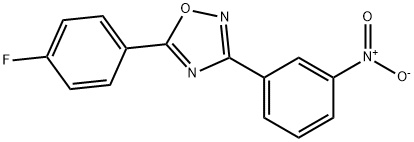
Azoles
- Product NameAzoles
- CAS421581-70-6
- CBNumberCB11326926
- MFC14H8FN3O3
- MW285.23
- MDL NumberMFCD09972142
- MOL File421581-70-6.mol
Chemical Properties
| Boiling point | 446.8±55.0 °C(Predicted) |
| Density | 1.389±0.06 g/cm3(Predicted) |
| storage temp. | 2-8°C |
| pka | -2.78±0.37(Predicted) |
| CAS DataBase Reference | 421581-70-6 |
Azoles Price
| Product number | Packaging | Price | Product description | Buy |
|---|---|---|---|---|
| TRC F621633 | 250mg | $55 | 5-(4-Fluorophenyl)-3-(3-nitrophenyl)-1,2,4-oxadiazole |
Buy |
| TRC F621633 | 500mg | $65 | 5-(4-Fluorophenyl)-3-(3-nitrophenyl)-1,2,4-oxadiazole |
Buy |
| Matrix Scientific 091023 | 1g | $181 | 5-(4-Fluorophenyl)-3-(3-nitrophenyl)-1,2,4-oxadiazole 95+% |
Buy |
| AK Scientific V5884 | 5g | $251 | 5-(4-Fluorophenyl)-3-(3-nitrophenyl)-1,2,4-oxadiazole |
Buy |
| Matrix Scientific 091023 | 5g | $471 | 5-(4-Fluorophenyl)-3-(3-nitrophenyl)-1,2,4-oxadiazole 95+% |
Buy |
Azoles Chemical Properties,Usage,Production
Pharmaceutical effect on Membrance Permeability
The antifungal azoles prevent the synthesis of ergosterol in the fungal membrane. These compounds block ergosterol synthesis by interfering with the demethylation of its precursor, lanosterol. Lanosterol demethylase is a cytochrome P450 enzyme and, although azole antifungals have much less influence on analogous mammalian systems, some of the side effects of these drugs are attributable to such action. Antifungal azole derivatives are predominantly fungistatic but some compounds at higher concentrations, notably miconazole and clotrimazole, kill fungi apparently by causing direct membrane damage. Other, less well characterized, effects of azoles on fungal respiration have also been described.Pharmaceutical Applications
A large group of synthetic agents, which includes drugs used in bacterial and parasitic infections (5-nitroimidazoles; benzimidazoles). Antifungal azoles have in common an imidazole or triazole ring with N-carbon substitution. The activity is essentially fungistatic, but some of the newer triazoles exert fungicidal effects at therapeutic concentrations. They are effective in the topical treatment of dermatophytoses and superficial forms of candidosis; several are suitable for systemic administration.Several molecular mechanisms of resistance have been elucidated. These include overexpression of efflux pump genes, point mutations in the gene that encodes the target enzyme, lanosterol demethylase, and overexpression of this gene. Changes in other enzymes involved in ergosterol biosynthesis, such as sterol desaturase, may also contribute to azole resistance.
Preparation Products And Raw materials
Azoles Supplier
Global(22)Suppliers
| Supplier | Tel | Country | ProdList | Advantage | |
|---|---|---|---|---|---|
| 8485655694 | sales@alchempharmtech.com | United States | 63687 | 58 | |
| 027-67849912 | sales@chemwish.com | CHINA | 10821 | 58 | |
| +86-0371-86658258 +8613203830695 |
laboratory@coreychem.com | China | 30233 | 58 | |
| +1-+1(833)-552-7181 | sales@aladdinsci.com | United States | 52924 | 58 | |
| 571-89925085 | sales@amadischem.com | China | 131957 | 58 | |
| 021-021-58432009 400-005-6266 |
sales8178@energy-chemical.com | China | 44689 | 61 | |
| 86-027-67849912 | sales@chemwish.com | China | 35896 | 56 | |
| 025-66099280 17798518460 |
cfzhang@aikonchem.com | China | 19915 | 55 | |
| 4009209199 | sales@9dingchem.com | China | 18209 | 56 | |
| 027-67849912 | sales@chemwish.com | China | 9148 | 60 |
421581-70-6, AzolesRelated Search
PROMPT×
PROMPT
The What'sApp is temporarily not supported in mainland China
The What'sApp is temporarily not supported in mainland China
Cancel
Determine